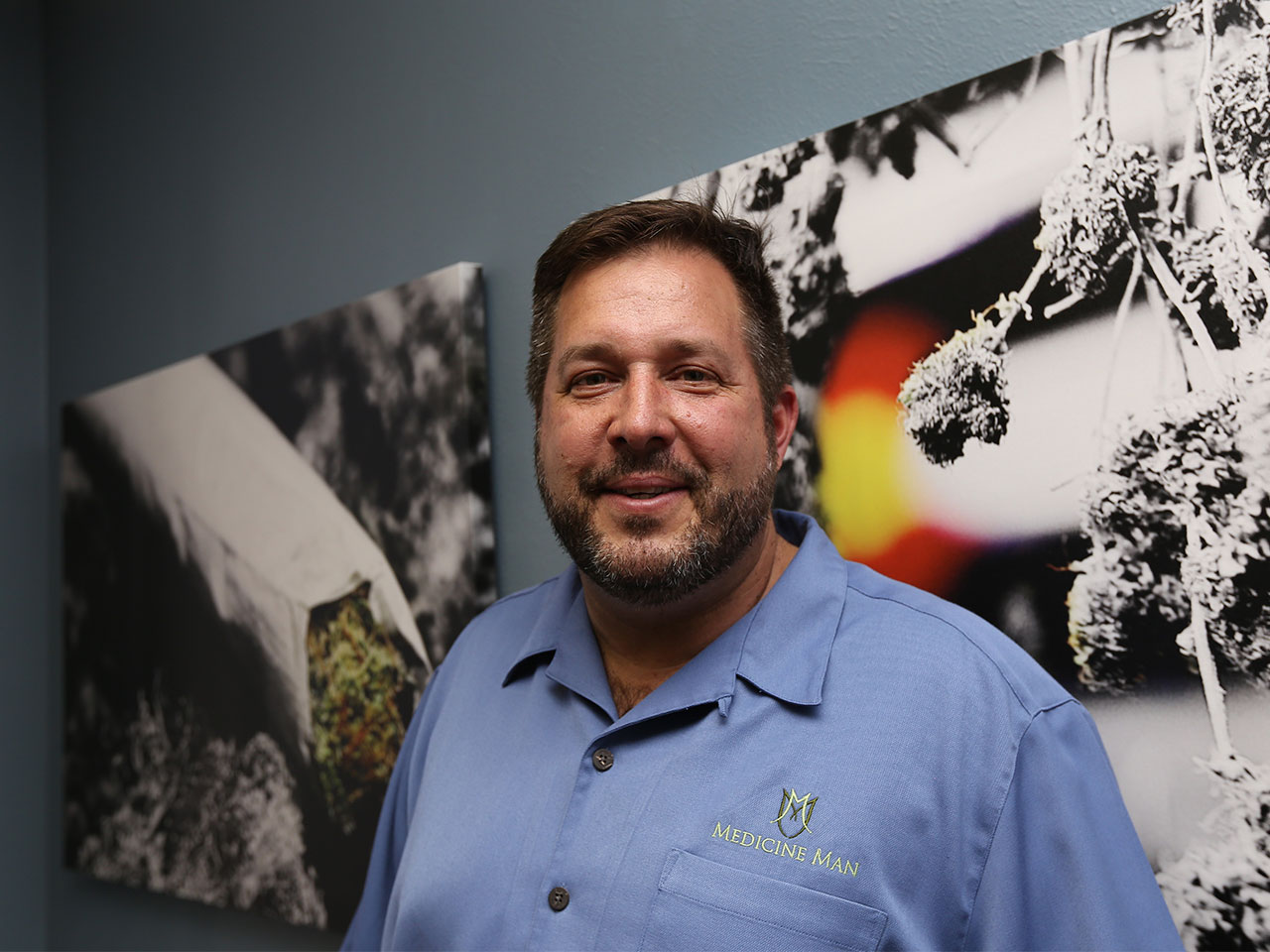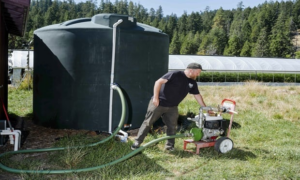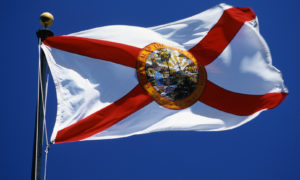Andy Williams Of Medicine Man Talks Marijuana Entrepreneurship

We sit down with Medicine Man’s Andy Williams about serial marijuana entrepreneurship
Andy Williams, President, and CEO of Medicine Man in Colorado has worked in a wide range of manufacturing industries as an industrial engineer and in leadership positions. He is a lifelong entrepreneur and passionate about multi-service aspects of the industry. In 2009 the Ogden letter was published stating the Department of Justice would not utilize their resources to prosecute those individuals following state marijuana laws. That was the call to a new opportunity in the marijuana industry for Andy and his brother, Pete Williams. In December of 2009, they launched Medicine Man with the concept of becoming the Costco of marijuana. Six years later Medicine Man is now a $17 million a year corporation and has branched out to assist start up marijuana companies and grow facilities across the country with their consulting company, Medicine Man Technologies. We sat down with Andy to discuss Medicine Man, Medicine Man Industries, and the hardships of growing a vertically integrated company in this industry.
Marijuana Retail Report: Andy Williams thank you so much for talking with me today. First things first, what made you want to take the leap into the shaky grounds of the retail cannabis industry from the safety of aerospace?
Andy Williams: Well, I’m a serial entrepreneur, and so my passions always been having my own business and I have been a failure at serial entrepreneurship, Until Medicine Man. Between my failures, I worked in the corporate world as an industrial engineer and I loved working. Don’t get me wrong. I always loved where I worked and worked hard while I was there, but my eye was always on the future and for opportunities that I could take by starting another business, and see if I can give it another go. I loved my work at Electronic Warfare Associates and Jeppesen, but when the Ogden memo came out in 2009, October saying that the federal government was going to make, or the justice department was going to make selling cannabis law a low priority for enforcement, I saw that as a huge opportunity. So I went to my brother who was also an entrepreneur and had a successful custom tile company, but he was a medical patient in Colorado and grew plants in his basement very successfully. He’s a great inventor. I went to him, and said, “Hey, let’s do it here, and let’s go big with it.” He had nothing better to do, so he agreed. That’s how we got started in it.
Marijuana Retail Report: And how is it working with family in this industry?
Andy Williams: It’s great for us. We have 10 family members including ourselves working at Medicine Man now, and we have a great family. A lot of entrepreneurs in our family, but with varied skill sets, and varied passions in terms of what type of work they like to do. Everybody has their role and they do it really well and work together well. It’s made our family … Well, we’ve always had a close family, but it’s made us even closer.
Marijuana Retail Report: Medicine Man, Denver is around 15 miles from the airport, I noticed, and also around 11 miles from downtown. How important was determining the location of your shop, and what went through that thought process?
Andy Williams: Well, that was fun. (laughs) This is partly dumb luck, right, so part of being a successful entrepreneur is being lucky sometimes. When we were looking for property, we had all kinds of criteria that we wanted to find; how much power, how much size, location, all that stuff and we soon found that nobody would talk to us. We had doors slammed in our faces, because people didn’t want to deal with the cannabis industry back then. Landlords were afraid of the federal government, and so we took the first person that said yes to us. That’s how that decision was made, and the guy that had the building, it’s a 40,000 square foot building, and 20,000 of it was occupied by a spice company. They made curry and Italian seasoning, all the different spices that you cook with, and it was really stinky so nobody would lease out the other space. That seemed perfect for us.
Marijuana Retail Report: Luck aside, operational choices like deciding your patient flow and picking your perfect point of sale system, are educated decisions. How did you make the decisions that led to you being able to build your business?
Andy Williams: I remember the day, we were standing outside the warehouse at the loading dock, and we were talking about, “What do we want to be as a business? What do we want to do?” We want to be good first in this industry as cultivators. Then, we decided if we wanted to be boutique or if we wanted to be volume. What do we want to do? We chose, at the time, to be big. You look at Costco and say there are great products in that store at a great value to me, great customer service et cetera, and they’re very successful. We said, “We want to be the Costco of marijuana.” and that’s what we started doing. The state soon made vertical integration a requirement, and I thank them for that every day. Then, we had to open a store, and again, dumb luck took over and our facility happened to have zoning that we could have a store in the front end of it, and we opened our store there. Then we had to figure out how to get people to the warehouse district to shop at our store. I remember some shops that we’re trying to sell some marijuana to wholesale, told us, “Hey, don’t raise the prices.” We had a good thing going. There’s only two of us in that area at the time. My brother, who’s the nicest guy and honest, looked at the guy and smiled, and said, “No, we’re pretty much going to put you out of business.” This is after the guy had just down-talked all of our marijuana, and was trying to talk our price down and stuff. Our first ad that ever came out was, “Let the price wars begin.” We always wanted to have a great product that we offered at the lowest price we can for our consumers while still making a profit so that we can stay in business. We didn’t care what everybody else was charging. We knew what we could do it for, and so that’s how we built the trust with our customers, and because of that, they’re very loyal. They get great value for great products at phenomenal prices as well as great customer service. As a consumer, you really can’t ask for more.
Marijuana Retail Report: Can you tell me about how you determine quality for your shop, especially with vertical integration? How do you determine what meets the bar?
Andy Williams: When we’re working on our genetics, which happens all the time, we’re constantly trying to improve our genetics through different means, and what we look for is good, big, and fast. Big and fast are empirical. You can measure those things in terms of how fast do they flower and how much do they produce in the way we grow. Good is measured from how well does it grow. Is it resistant to molds and mildews? Pests? Is it hardy in that it doesn’t hermaphrodite easily? Is it easy to trim? Then we also look at how’s it tests in terms of cannabinoid make up and potency, and then also how well it sells. All that goes into judging what strain is the best strain for us and what eventually goes and stays on our shelves.
Marijuana Retail Report: Retailers obviously are always confused about which products they should be stocking. Can you tell me a little bit about how you decide which accessories to stock? How are you able to tell what will work and what won’t for your patients?
Andy Williams: Some of that’s trial and error in that for accessories, we bring in different things all the time. We look for new products, we look for different styles of high-end glass versus low-end glass, one hitters versus bongs, et cetera, and we’ll put pieces out. We let our consumers decide if they want them or not. Some of it is literally putting it on the shelf, marketing it to the consumers, and if they buy it, then we continue to carry it. If they don’t, then we don’t. Same with other types of merchandising. We have relationships with many manufacturing companies that do the edibles, tinctures, concentrates, and everything in-between. We built those relationships over long periods of time because we know their products are good, and we’ll carry them. We also have staples on our shelf that consumers like, and as new companies come along and offer new brands, we try them out as well. Again, it comes down to will the consumers buy them. We offer space in our facility for vendors to come in and introduce their product to the consumers as they’re shopping. We also make sure to train our bud-tenders on different products so every week where we have a meeting and invite a vendor in to introduce products to them so that they can better sell them to the consumers, and understand how to use them or what they’re good for, et cetera. It’s a constant trial and error, but also a little bit knowing what the consumer’s looking for before they do. I know micro-dosing is going to start picking up popularity as cannabis becomes more seen in social places, like weddings or parties. For instance, if you’re drinking an elixir of some sort, you don’t want to just have one elixir all night, one bottle of whatever. You want to have three or four, because you don’t want to walk around the party without a drink, or you don’t want to be empty handed when there’s a toast. I see micro-dosing becoming more prevalent as this becomes more integrated into social events.
Marijuana Retail Report: Do you see franchising as the future of the industry for major players like Medicine Man?
Andy Williams: Wow, that’s a big question. Yes. We already have a company called Medicine Man Technologies. That trades on the OTCQB markets under the stock symbol MDCL, and so because franchising is a federal process, we can’t do that, but we do licensing. This company’s been in business since March of 2014, and we have clients in 14 states. Not only do we help them get their license and design and build their facilities, train their employees, get their systems up and running, get their business opened for cultivation, manufacturing, and retail operations, we also have our own nutrient line, called Success Nutrients. That is the best nutrient line available today. I use it in my own facility. I wouldn’t use it otherwise because it would cost me too much money in lost production.
Marijuana Retail Report: What made you guys decide that you wanted to become a full-service consultant in every branch of the industry?
Andy Williams: Early on, as we were developing our processes and procedures and techniques, et cetera, and all the equipment that we had to invent because it didn’t exist. We literally had to invent it. I always knew that some day in my life, I would be consulting. I just knew that, but I was wearing a lot of hats at the time, HR, and chief plant waterer, and manager, whatever, you name it, we’re all doing it. I had a gentleman come in that I knew who said, “Hey, Andy. You have a lot of intellectual property here. Why don’t you form a consulting company and help other people do what you do, and make money at the same time?” I said, “Yeah. I’ll do that in my spare time.” He said, “Hey, I’ll do it for you. I’ll build the foundation of this company, with your help and your people’s help, and we’ll do it together.” That’s how that started. Once we started the public company, it gave us a lot of freedom and access to capital to be able to make acquisitions and to expand warehouse brands that cut across the entire industry. We have other companies as well. I just started a company with another gentleman called Break Water MD that is a company to take other cannabis companies public, so I’ve had such a phenomenal experience in taking my company public that I thought, “Hey, I can help others do the same thing.” This company was launched in May, and we’re targeting four companies, and I think we have two identified now, but to take public that are in the cannabis space, and so that’s another thing we’re doing. Then, I have a research company called MedPharm, which is licensed as a marijuana seeds product company in Colorado under both recreational and medical laws, but it’s real purpose is to research cannabis and move the body of science forward on that front, and develop unique dosage forms that really find the formulation of those magic compounds within the plant, put them in the right dosage form, and to reliably and repeatably impact the human condition of anyone.
Marijuana Retail Report: I saw on the newsfeed that Medicine Man Technologies recently agreed to terms to acquire the Denver Consulting Group. To me, that’s fantastic proof that not only can businesses thrive in this industry, but they can diversify and continue to grow. Coming to that decision, what was the thought process behind deciding to acquire an additional company?
Andy Williams: There’s a lot that went into that. I know Greg and Justin and their team really well, and they have a phenomenal reputation. They have reach in the areas that are far better than mine and our respective companies. They’re very focused in California and Oregon, west coast, and while we have clients there, we wanted a bigger presence, so Greg is actually going to be officed in California, and Justin’s going to be officed in Portland. We’ll be able to expand our presence in those markets that are going to be big and just continue to get bigger. In addition, just adding their reputations to our business is phenomenal. In our company now, we have myself, we have Brett Roper, Josh Haupt from Three A Light, and Greg and Justin of DCG. Diversifying in the cannabis industry’s important, because as this industry gets bigger and bigger, it’s going to become a commodity. If you look at tobacco, if you look at beer, I know a lot of people don’t want that to happen, but it is inevitable, and in order to survive long term you have to have that diversification of revenue streams so that you’re not counting on just one. For instance, if you’re just a cultivator, and you’re not a unique cultivator, meaning you don’t have specific strains that are very unique, or really high quality to fill a niche in the market, then being able to compete with people that are going to be growing on such a large scale is going to be very difficult. I don’t think that’s short term, but longer term. If you’re thinking long term, it’s going to be your saving grace in this industry.
Marijuana Retail Report: What’s next for you guys? What’s next for you personally, and what’s next for the Medicine Man brand?
Andy Williams: That’s a good question. I have a couple things in the pipe. Break Water and Medicine Man Technologies will continue to be a focus of mine. It’s phenomenal. I don’t have the scientific background for MedPharm, but I can help on the legislative front there, to help promote the ability for clinical researchers to work with cannabis companies in order to expand the body of knowledge when it comes around, the scientific body of knowledge for cannabis. I’ll continue to do that. I am talking right now with a company that if this comes to fruition, we’ll be looking at Oregon as one market, and California as another market for Medicine Man to expand into. Then, working on a top secret project on the side … I can’t really talk about it now, but there’s another project I’m working on that blows the rest away in terms of what it could be, but your readers will just have to wait to hear about that one.
Marijuana Retail Report: Haha we will have to get you to come back when you’ve launched it. Andy Williams, President and CEO of Medicine Man & Medicine Man Technologies thank you so much for talking with us today.
Andy Williams: My pleasure.




































